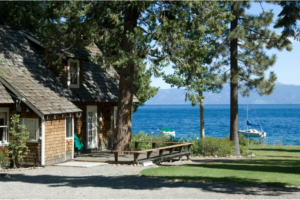Unlocking the Secrets of Cottage Succession
 Cottage properties on Michigan lakes are expensive. So are Michigan real estate taxes. Passing a cottage property to the next generation without triggering an uncapping of the property’s taxable value can be financially advantageous. Owners who wish to ensure this result need to be aware of several aspects of estate planning and business law.
Cottage properties on Michigan lakes are expensive. So are Michigan real estate taxes. Passing a cottage property to the next generation without triggering an uncapping of the property’s taxable value can be financially advantageous. Owners who wish to ensure this result need to be aware of several aspects of estate planning and business law.
Transferring Residential Property in a Trust to Family Members
Under Section 211.27a(6) (d) of the General Property Tax Act, a conveyance of property through a trust distribution is generally treated as a transfer of ownership for purposes of uncapping taxable value. In 2014, however, the Michigan legislature passed a statute allowing for distributions of residential real property from a trust by a settlor or the settlor’s spouse to certain family members without causing an uncapping.
The statute specifies that “if the distributee is the settlor’s or the settlor’s spouse’s mother, father, brother, sister, son, daughter, adopted son, adopted daughter, grandson, or granddaughter, and the residential real property is not used for any commercial purpose following the conveyance,” the distribution is not an uncapping event. MCL 211.27a(6)(d)(ii). This means that residential property held in a trust can be transferred to the next generation without triggering an increase in property taxes, provided it meets the specified conditions.
Residential Property Held in a Cottage LLC
Placing property within a Limited Liability Company (LLC) is a good way to protect the property owner from personal liability. This is an especially important concern if the owner intends to lease the property, including leasing it through platforms like VRBO. A cottage LLC also provides a useful structure for handling inheritance issues when multiple children are involved. The LLC’s Operating Agreement can address various matters like access rights, maintenance obligations, cost sharing, limitations on property usage, and provisions for situations where an owner wishes to sell their share.
While using an LLC for liability protection and management concerns is, in many ways, a good strategy, transferring property held in an LLC does not protect the cap on taxable value. Under current Michigan law, transferring more than a 50% interest in an LLC that owns land is a real estate tax uncapping event. MCL 211.27a(6)(h).
Protecting Personal Liability and Preventing Uncapping
If owners want to keep the cap on real estate taxes in a generational transfer, then instead of putting the property into an LLC, they can accomplish some of the same goals by ensuring they have adequate liability insurance and an agreement that will bind future owners. Such owners are likely to be tenants in common (TIC). The agreement can help mitigate conflicts and clarify how owners share and manage the property. It should address all the issues that would otherwise have been covered in an LLC Operating Agreement.
Tenants in Common and Potential Partitioning Actions
A significant concern for TIC owners is the right to partition the property. For example, if three children inherit a Michigan cottage, and one of them lives in Arizona, the latter may want to be bought out and can initiate a partition action for this purpose in Circuit Court. This can cause complications if the remaining owners cannot afford or do not wish to buy out the owner requesting partition.
Avoiding this risk is another good reason for TIC owners to have a comprehensive agreement that addresses all potential issues, especially what will happen if an owner wants to sell their share. The agreement can help prevent disputes and provide a framework for resolving conflicts amicably.
Get Professional Help to Ensure a Positive Outcome
Careful planning and comprehensive legal agreements can preserve tax advantages and minimize potential complications in passing on cottage properties to the next generation. Contact a qualified attorney who specializes in estate planning and real estate law for tailored advice based on your specific circumstances.
